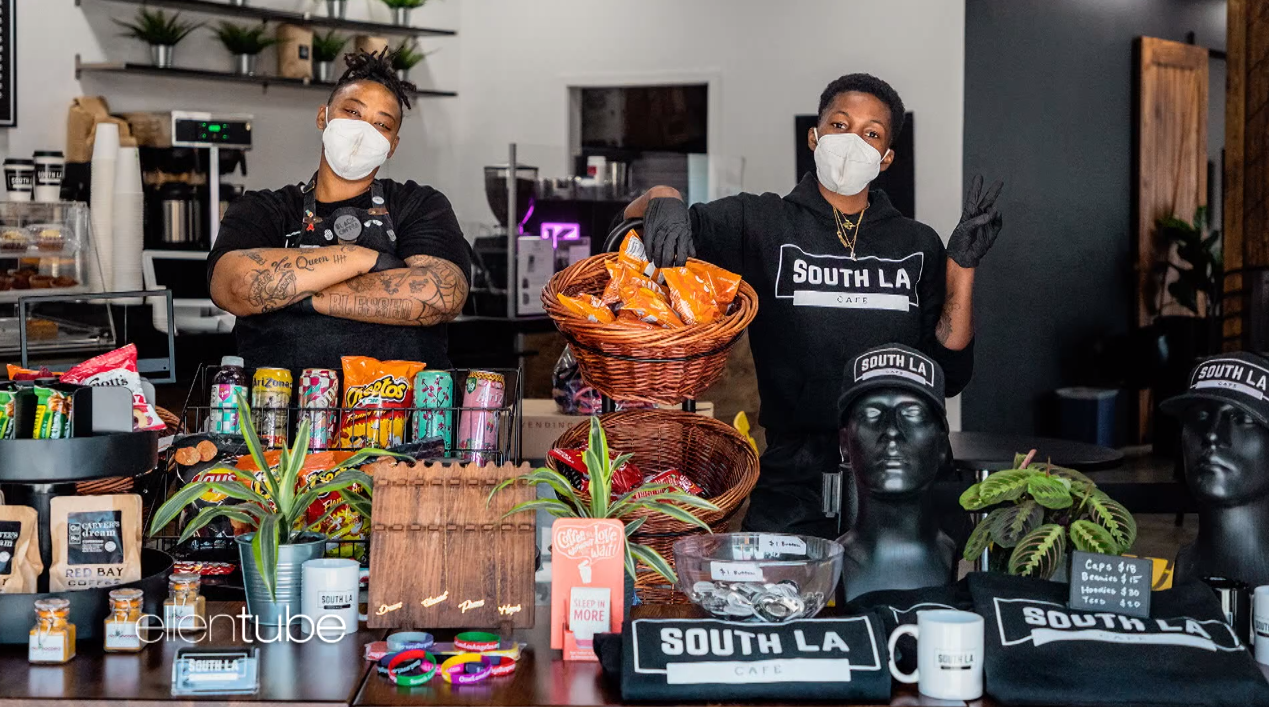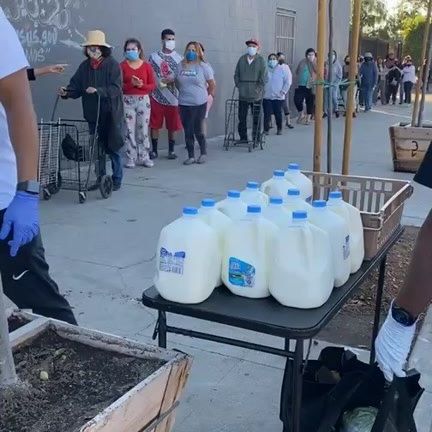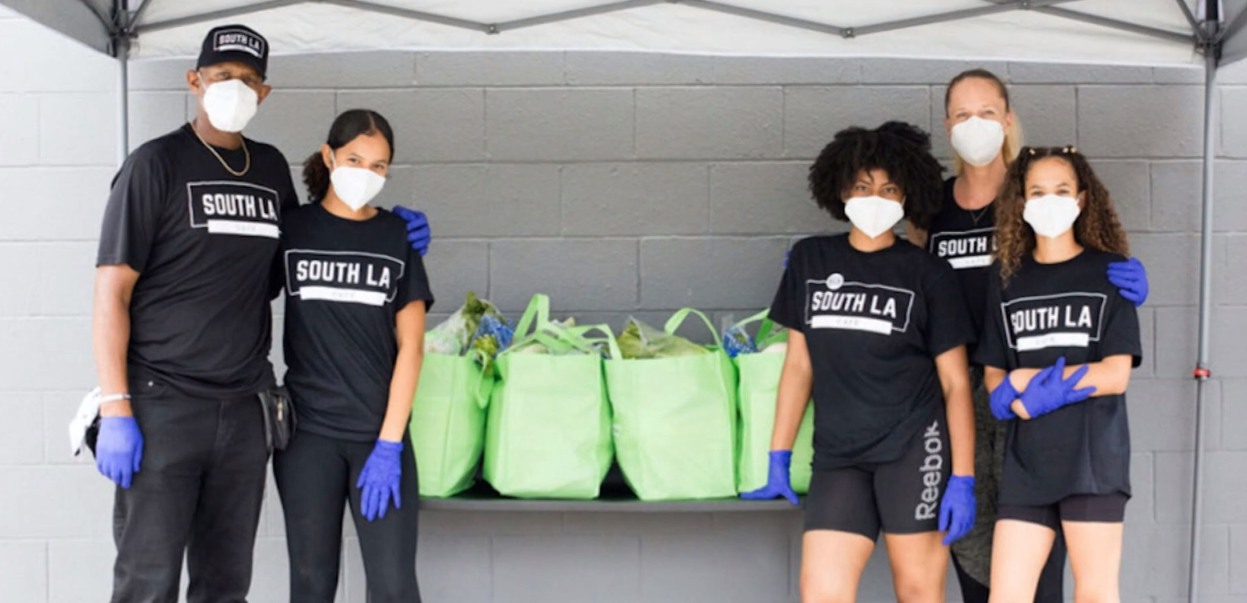If you want to see pure, unadulterated surprise and joy, watch Joe and Celia Ward-Wallace’s ’98 response to receiving a $25,000 check from Ellen DeGeneres when they appeared on her TV show.
This reaction helps illustrate why the Ward-Wallaces were able to turn a potentially devastating blow to their livelihood into a crusade to provide food for their community, an appeal which has garnered support far and wide, from locals in the couple’s South Los Angeles neighborhood to rich and famous celebrities.
The Ward-Wallaces realized a longtime dream when they opened South LA Café in November 2019, less than three months before the COVID-19 pandemic shut down large parts of the economy. Their reaction was to start providing food to those who could not afford it, giving out 150-250 bags of food per week. When donations didn’t cover their costs, they footed the bill themselves so no one was turned away.
It really came from doing the work and learning the lessons and laying the foundation.
The establishment specializes in coffee and pastries, and features fresh, affordable, and healthy food options often missing in underserved communities. It is one of 27 black-owned restaurants chosen for Beyonce's Black Parade Route. And Ariana Grande is a regular who frequently promotes them on her social media.
Why the immediate popularity? We got answers to this question and more in a recent conversation with Celia Ward-Wallace.
UCLA Alumni: You opened South LA Café in November 2019 and you seemed to be an immediate hit, with coverage on local news stations and major newspapers like the L.A. Times and Washington Post, and over 10,000 Instagram followers within four months. How did this overnight success happen?

There have been lots of twists and turns, but we’ve always been doing what we would say is social entrepreneurship in one way or the other, and I’ve been a full-time coach and consultant over the last 10 years on entrepreneurship before opening up the café. I always teach students to keep their day job and start a side hustle; it’s usually a minimum of a three- to five-year journey to be able to earn “full-time” income — to be able to actually leave a job and become a full-time entrepreneur.
A lot of my teaching was around “slow and steady wins the race.” And we work very hard — we’ve been working 100 hours a week since the pandemic started. We have a lot of wisdom, experience, ingenuity and innovation, but it’s also been good old fashioned hard work ethic, which is sort of the secret sauce.
So, though a lot of people might see this as an overnight success, it’s really been a two-decade journey to landing in this level of resonance that didn’t come from nothing — it really came from doing the work and learning the lessons and laying the foundation. As Oprah says, when opportunity meets preparation, the big, great things come to you.
Joe was born and raised in South Central [now rebranded “South L.A.”]; how did your involvement with the community begin?
I come out of a multiple-generation legacy of community organizing; in particular, anti-racism work. My parents are full-time community organizers and the bulk of the work that they did was supporting organizations and movements in South Central. So I was one of these unique kids who grew up with a picket sign in her hand and was on the picket line and doing demonstrations since I was literally able to walk. When I got a little older, most of the friends I had made were in South Central. I actually grew up in Mid-City, which is just a stone’s throw away, but I would spend afternoons and weekends in South Central with my friends. When I got older and I met Joe, that’s where we moved and so we’ve been here ever since.
So the whole point of this space was really an anti-gentrification effort, anti-food-desert, anti-food-insecurity effort and also just creating safe spaces in particular to center upon the black and brown local community.
The café is very much of – and for – your community, and local support is extremely strong, but you have also been able to gain attention and assistance from people all over the world. What has all of this support meant to you? What are your hopes for the café and how have they changed with the pandemic?

And when COVID hit, and our revenue fell 70-80%, we pivoted and we sort of felt that we were made for this. We have spent our lives in that community, advocating for that community and we have accumulated a lot of privileges that most of the people in our community don’t have. So there has always been that awareness that we’re in a position that many people aren’t and we have to leverage all that we can to advocate for our community and to bring empowerment to the community.
What roadblocks did you encounter in starting the café?
Getting approved for a small business loan was the scariest thing in the world. We got halfway through our construction project and realized we just did not have enough money – nobody had really mentored us to knowing how much it was actually going to cost and we started thinking, “If we don’t get another wave of cash flow, we’re not going to be able to open the café.” But we went to the community through a GoFundMe crowdfunding effort and we were able to raise the money we needed while we waited to get approved for the small business loan, which we eventually did.
Because we’ve been so transparent about our mission and our vision, when we were down and saying to the community, “We really need to keep these doors open because you guys love us but if you don’t help us, we’re not going to be able to do this,” the community responded.
And on top of this, we said, “We’re getting this really crazy idea that we’re going to start feeding people every week and we’re going to take any extra profits from the café and put them into a food distribution program. Can you help us?” And again, we were just so grateful to see this overwhelming amount of support.
How have you been able to continue to provide food for those in need?
We have a monthly sustainer supporter program, where people can give $10 or more a month ongoing, and we have people who specifically want to sponsor our food distribution South L.A. grocery giveaway, which began last June — for $35 they can sponsor a grocery box and feed a family of four. We try to take our experience and our business and marketing acumen and intersect it with the social impact goals that we have and maximize what we can do.
You now have over 38,000 Instagram followers. How have you been able to build your social media reach so successfully?
This I somewhat attribute to our background in teaching entrepreneurship and really studying the concepts around resonant marketing approaches, really thinking about how to use the social media platforms in a way that builds connection and builds that authenticity that people really can buy into instead of using it as a tool for manipulation or pressure tactics.
What we’re trying to do is bring the community in so they can experience the connection.
We really understood that the coffee is the product — that’s really where the sales begin — but what we’re trying to do is bring the community in so they can experience the connection.
Posts can be funny videos, or info on COVID testing, or something uplifting about the neighborhood. Every fourth, fifth or sixth post is about the café: “Come on in and get a cup of coffee,” or something like that. They tune in because they love our content, and vicariously they want to experience it. It’s been very strategic on our part; we don’t want to spam our followers, we want them to feel like we’re in a relationship with them, that we truly care about them and that we’re not here to manipulate them. We value the respect and the trust we have in them so highly that we’re at the stage now where we’re very, very selective in how we utilize our platform and who we partner with, because we know that we have something that is very rare, that most brands or businesses would die to have, which is the trust of their community. If we say that we’re endorsing this organization or this business or this person, they’re going to believe us and they’re going to follow that person and want to know more about that person. We don’t take that trust and loyalty lightly.
We really try to use our platform for good and try to amplify others. There are so many people who do great things but do not have a big following, and yet, they need people to know what they’re doing, either to support them financially or just to access their opportunities. So, all day long in our stories, we very consciously promote anybody who is doing great things. I think people love following us because they see that.
In addition, we are aware that people want to go on a journey with us — and by us, I mean the Ward-Wallace family, as well as the extended team that we’ve developed, like our staff or volunteers. The more that we can give them of the behind-the-scenes experience — people love that.
As we rise, they rise.
What do you think the café and the charitable work you’re doing means to the community?

And I said, “Wow, that’s so cool, what are they saying?”
He said, “First of all, everybody knows who you are. Secondly, everything anybody ever says is positive. We get so excited to see how people receive you guys, because we feel like we’re going along for the ride with you.”
That’s something that makes us really happy. Because for far too long, South L.A. has only been known for the negative things that have shown up on TV, on the news or in movies. We love this community, we love all of it, and we are proud to be representatives of the community. We want as many opportunities as possible to put our community on the map and show how dynamic and culturally rich it is and how deep the history is, so that we can advocate for the people of this community and take them all on a journey with us. As we rise, they rise.
It looks like there’s light at the end of the COVID tunnel – what are you seeing from your end? Are you able to open up in a limited fashion? Will you be bringing your employees back soon?
We have already brought back all of our employees, so that’s good news. We have eight employees right now and we’re in the hiring process. Our business has actually been able to grow over the past year, of all things. Because we’ve deepened our work into food justice, we’ve created additional opportunities with our grocery box program to work with local nonprofits to be their preferred grocery provider for their people in the community. That’s been a huge opportunity that we’re just literally scratching the surface of.
We feel such a high level of responsibility to our community that we are not rushing to put anybody’s life in jeopardy just to be able to sit inside.
This past year, even though it was been extremely challenging, it has actually been a huge growth period for us. We’ve been able to weather the storm and maximize our growth with all of the pivots that we’ve done, even while deepening our philanthropic efforts at the same time. We did launch our nonprofit organization, which is the SLAC Foundation, and through that work we’re beginning to take contributions and apply for grants. We’re going to be working on additional food programs to fight food insecurity, as well as business development programs to help build up the local businesses so that they will be pandemic- and recession-proof in the future. We’ve also been able to get our vaccine shots so we’re fully inoculated.
We are not rushing back to open up inside even though the guidelines say that we can now do that. Being a lower income community of color, we’ve seen the impact of COVID-19 at a level that most people are unaware of. Because of that, we feel such a high level of responsibility to our community that we are not rushing to put anybody’s life in jeopardy just to be able to sit inside. We will continue to offer our outdoor patio seating, which is absolutely fantastic. We have 10-12 tables and chairs set up outdoors that are all socially distanced. We have free WiFi, great music pumping and a whole vibe that’s happening on our patio. I think for quite some time we’re going to continue to utilize our outdoor dining space as our primary offering and then if we get to a place where it’s clear that the signs have completely changed, then I think we’ll reconsider.

Has your UCLA experience played a part in your success – and in shaping the trajectory of your life?
For sure, 100%.
I was an absolutely fantastic high school athlete, but I wasn’t a division I basketball player, so I decided to go to UCLA for academics instead of going to a division II or division III school for basketball. But I lucked up on getting this job at the Wooden Center, where I got to work every day and work out every day and play basketball every day - and it’s where I met, in my freshman year, my BFF to this day, Brandie Barrera. I still remember to this day us talking at the Wooden Center, the day after I had gone on my first date with Joe.
I double-majored in world arts & cultures and sociology but I did the bulk of my upper division course of study with Dr. Jerome Rabow – he specializes in intergroup consciousness and prejudice trainings, and I did a ton of training with him on leading groups around discussions about race/class/gender. And in the world arts & cultures department it was a study of the intersection between cultures and all the ways that art is at play, whether it’s dance or music or painting or sculpture or landscape design. I lobbied to create my own major; therefore, I was able to design it the way I wanted, to take the classes that I wanted. It was in the midst of the prop 187 and prop 209 movements that I was very involved with as a student activist, and then I went into those two majors, where I was able to do a deep dive into sort of the past, present and future of intersectionality.
I love UCLA, I loved being a student there; I have such fond memories of it. My parents were committed to public education and I grew up going to LAUSD schools my entire life and then we chose UCLA because of it being a public school as well. We had other options but we decided to go that route. I’ve never felt anything but pride from being a graduate of there.
South L.A Café is located at 1700 Browning Blvd. in South Los Angeles. They are open Monday – Saturday, 8 a.m. – 1 p.m. If you’d like to become a supporter, visit www.southlacafe.com.